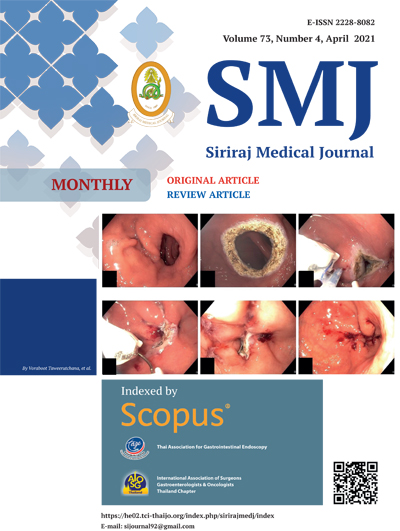Validity and Reliability of Lymphoedema Functioning, Disability and Health Questionnaire (Lymph-ICF) Thai Version
DOI:
https://doi.org/10.33192/Smj.2021.35Keywords:
Breast cancer, Lymphoedema; Lymphoedema questionnaire, Quality of life, Reliability, Thai, ValidityAbstract
Objective: The study objective is to adapt the Lymphoedema functioning, disability and health questionnaire (Lymph-ICF) for use in the Thai language and to investigate the validity and reliability of the Thai version.
Materials and Methods: This study was done in 5 stages in line with established guidelines for cross-cultural adaptation of self-report measures; 1) Initial translation 2) Synthesis of the translations 3) Back translation 4) Expert committee review and 5) Test of the prefinal version. The face validity was assessed by interview content experts. In the assessment of the validity of the construct, the Spearman correlation coefficient was used to examine the correlations between the scores of the Thai Lymph-ICF and the scores of the Thai EQ-5D-5L. The intraclass correlation coefficient (ICC) was used to establish test-retest reliability while Cronbach’s alpha was used to determine the internal consistency of the whole questionnaire and of each domain.
Results: Fifty participants were evaluated for validity and reliability. Face validity was supported. Construct validity showed strong correlations between the scores of the Thai Lymph-ICF and the scores of the Thai EQ-5D-5L. Internal consistency and test-retest reliability were both excellent.
Conclusion: The Lymph-ICF Thai version was shown to be both valid and reliable for evaluating the quality of life of patients with breast cancer-related lymphoedema.
Downloads
Published
How to Cite
Issue
Section
License
Authors who publish with this journal agree to the following conditions:
Copyright Transfer
In submitting a manuscript, the authors acknowledge that the work will become the copyrighted property of Siriraj Medical Journal upon publication.
License
Articles are licensed under a Creative Commons Attribution-NonCommercial-NoDerivatives 4.0 International License (CC BY-NC-ND 4.0). This license allows for the sharing of the work for non-commercial purposes with proper attribution to the authors and the journal. However, it does not permit modifications or the creation of derivative works.
Sharing and Access
Authors are encouraged to share their article on their personal or institutional websites and through other non-commercial platforms. Doing so can increase readership and citations.















